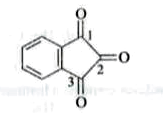Important properties of carbonyl compounds are : nucleophilic addition and acidity of α-hydrogen atoms. ,
Which factor is most useful in explaning these two ?
Presence of carbon-oxygen double bond.
Resonance in carbonyl group.
Ability of oxygen to accommodate negative charge.
All are equally important.
The correct Answer is:C
To solve the question regarding the important properties of carbonyl compounds—specifically nucleophilic addition and the acidity of alpha-hydrogen atoms—we need to analyze the underlying factors that explain these properties.
Step 1: Understand the Structure of Carbonyl Compounds
- Carbonyl compounds contain a carbonyl group (C=O) where carbon is double-bonded to oxygen.
- The carbon atom is bonded to either hydrogen or an alkyl group.
Hint: Remember that the carbonyl group is the defining feature of aldehydes and ketones.
Step 2: Analyze the Electronegativity of Oxygen
- Oxygen is more electronegative than carbon, which leads to a polarization of the C=O bond.
- This results in the carbon atom acquiring a partial positive charge (δ+) and the oxygen atom acquiring a partial negative charge (δ-).
Hint: Think about how electronegativity affects charge distribution in molecules.
Step 3: Nucleophilic Addition Reaction
- Nucleophiles are attracted to the positively charged carbon atom due to its partial positive charge.
- The nucleophile attacks the carbon, leading to the formation of a tetrahedral intermediate.
Hint: Consider how the charge on the carbon atom influences its reactivity with nucleophiles.
Step 4: Acidity of Alpha-Hydrogen Atoms
- Alpha-hydrogens are the hydrogens attached to the carbon adjacent to the carbonyl group.
- When an alpha-hydrogen is removed, it generates a carbanion (negatively charged carbon atom).
Hint: Recall that the stability of the resulting carbanion is crucial for acidity.
Step 5: Resonance Stabilization
- The negative charge on the carbanion can be delocalized onto the oxygen atom through resonance.
- This delocalization stabilizes the carbanion, making the alpha-hydrogens more acidic.
Hint: Think about how resonance can stabilize negative charges in organic molecules.
Step 6: Conclusion on the Key Factor
- The ability of oxygen to accommodate a negative charge is the most significant factor explaining both nucleophilic addition and the acidity of alpha-hydrogens.
- This ability allows for the stabilization of the positive charge during nucleophilic attack and the negative charge during the deprotonation of alpha-hydrogens.
Final Answer: The factor that is most useful in explaining these two properties is the ability of oxygen to accommodate a negative charge.
- Carbonyl compounds contain a carbonyl group (C=O) where carbon is double-bonded to oxygen.
- The carbon atom is bonded to either hydrogen or an alkyl group.
- Oxygen is more electronegative than carbon, which leads to a polarization of the C=O bond.
- This results in the carbon atom acquiring a partial positive charge (δ+) and the oxygen atom acquiring a partial negative charge (δ-).
- Nucleophiles are attracted to the positively charged carbon atom due to its partial positive charge.
- The nucleophile attacks the carbon, leading to the formation of a tetrahedral intermediate.
- Alpha-hydrogens are the hydrogens attached to the carbon adjacent to the carbonyl group.
- When an alpha-hydrogen is removed, it generates a carbanion (negatively charged carbon atom).
- The negative charge on the carbanion can be delocalized onto the oxygen atom through resonance.
- This delocalization stabilizes the carbanion, making the alpha-hydrogens more acidic.
- The ability of oxygen to accommodate a negative charge is the most significant factor explaining both nucleophilic addition and the acidity of alpha-hydrogens.
- This ability allows for the stabilization of the positive charge during nucleophilic attack and the negative charge during the deprotonation of alpha-hydrogens.
Similar Questions
Knowledge Check
Which carbonyl group of the given compound is most reactive for nucleophilic addition reaction?
 A1B2C3DAll have equal reactivity
A1B2C3DAll have equal reactivityWhich of the following compounds is most reactive towards nucleophilic addition reactions ?
ACH3−O∣∣C−HBCH3−O∣∣C−CH3C D
D
Discuss the relative reactivities of carbonyl compounds in nucleophilic addition reactions.
View SolutionThe reactivity of carbonyl compounds towards nucleophilic addition reaction gets affected by
View SolutionWhich carbonyl compound will not give addition reaction with water ?
View SolutionWhich one is most reactive towards nucleophilic addition reaction?
View SolutionDescribe two nucleophilic addition reactions of carbonyl compounds.
View SolutionWhich of the following compounds undergoes
nucleophilic substitution most readly?
View Solution
